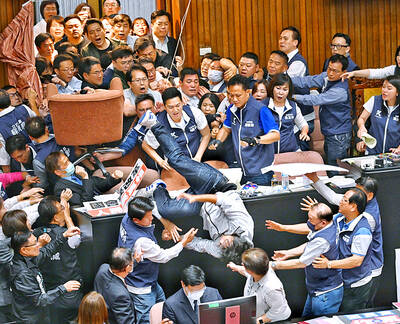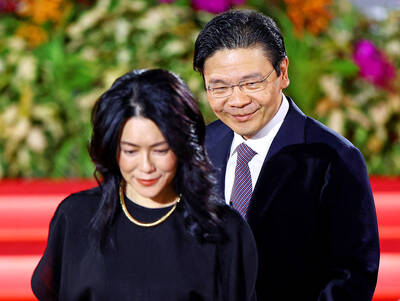A film about an Australian-Chinese war hero in which the lead role is played by a white actor has provoked anger in Australia at the “whitewashing” of the nation’s history.
Billy Sing, whose father was Chinese and mother British, was a decorated soldier from the disastrous Gallipoli campaign of World War I at which he earned the name “the assassin” for his success as a sniper.
But in the yet-to-be released TV film The Legend of Billy Sing, his character is played by a young Caucasian actor.
“I’m very sorry to learn that somebody is trying to whitewash a Chinese-Australian face with a white face. It’s a disgrace,” said Tony Pang, president of the Chinese Australian Forum.
“To see this distortion of historical fact — it’s sad,” he said.
Pang said Australia’s Chinese community had been subjected to such treatment in decades gone by, but that times had changed.
“The question I ask myself is: What if [former prime minister] John Howard is being played by a Pakistani? It’s ridiculous. It’s just not appropriate,” he said.
Director Geoff Davis, who cast his son in the lead role, defended his decision to the Australian newspaper last week, saying he had been unable to find an actor to play Sing’s Shanghai-born father.
The filmmaker said his aim was to “create a fictional story validated by having people perform true deeds, in the tradition of the historical novel.”
Former National Party senator Bill O’Chee, whose father was Chinese and mother Irish-Australian, said he was “deeply disappointed.”
“We’ll now have people growing up thinking Billy Sing was white,” he said.
Henry Makeham of the Australia-China Youth Association said the film was a lost opportunity to showcase the contribution of ethnic minorities to Australia’s wartime history.
There was no dearth of Australian-Chinese actors who could have fit the role, he said.
“It was essentially a whiting out of a Chinese-Australian hero,” he said.
Queensland-born Sing was the most successful sniper in the Gallipoli campaign, killing more than 200 enemy soldiers. He died in 1943.

MUSICAL INTERLUDE: During the altercations, KMT Legislator Hsu Chiao-hsin at one point pulled out a flute and started to play the national anthem A massive brawl erupted between governing and opposition lawmakers in the main chamber of the legislature in Taipei yesterday over legislative reforms. President-elect William Lai (賴清德) is to be inaugurated on Monday, but his Democratic Progressive Party (DPP) lost its majority in the legislature and the Chinese Nationalist Party (KMT) has been working with the Taiwan People’s Party (TPP) to promote their mutual ideas. The opposition parties said the legislative reforms would enable better oversight of the Executive Yuan, including a proposal to criminalize officials who are deemed to make false statements in the legislature. “The DPP does not want this to be

Singapore yesterday swore in Lawrence Wong (黃循財) as the city-state’s new prime minister in a ceremony broadcast live on television after Lee Hsien Loong (李顯龍) stepped down following two decades in office. Wong, formerly deputy prime minister, was inaugurated at the Istana government office shortly after 8pm to become the second person outside the Lee family to lead the nation. “I ... do solemnly swear that I will at all times faithfully discharge my duties as prime minister according to law, and to the best of my knowledge and ability, without fear or favor, affection or ill-will. So help me God,” the

A group of 30 foreign academics yesterday released a statement condemning legislative reforms proposed by opposition lawmakers, saying they are unconstitutional and undermine the objective of good governance. The statement publicized at a news conference in Taipei is cosigned by international academics, journalists and politicians, including former American Institute in Taiwan directors William Stanton and Stephen Young, and Formosan Association for Public Relations president Bob Yang (楊英育). The Chinese Nationalist Party (KMT) and Taiwan People’s Party (TPP) have put forward a set of legislative reforms that would introduce “contempt of legislature” charges, require the president to answer lawmakers’ questions and expand the

PURSUING PEACE: As the new president took office, he reiterated Taiwan’s sovereignty while saying that the nation must cooperate with other democracies President William Lai (賴清德) in his inaugural speech yesterday called on Beijing to acknowledge Taiwan’s government and engage in dialogue with Taipei, saying that both sides are responsible for promoting peace in the Taiwan Strait. “I hope that China will face the reality of the Republic of China’s existence” and “in good faith ... engage in cooperation with the legal government chosen by Taiwan’s people,” Lai said in front of the Presidential Office Building in Taipei. Lai reaffirmed that his government would adhere to former president Tsai Ing-wen’s (蔡英文) policy toward China and work to maintain the “status quo.” Lai advocated for dialogue